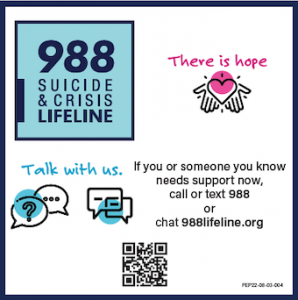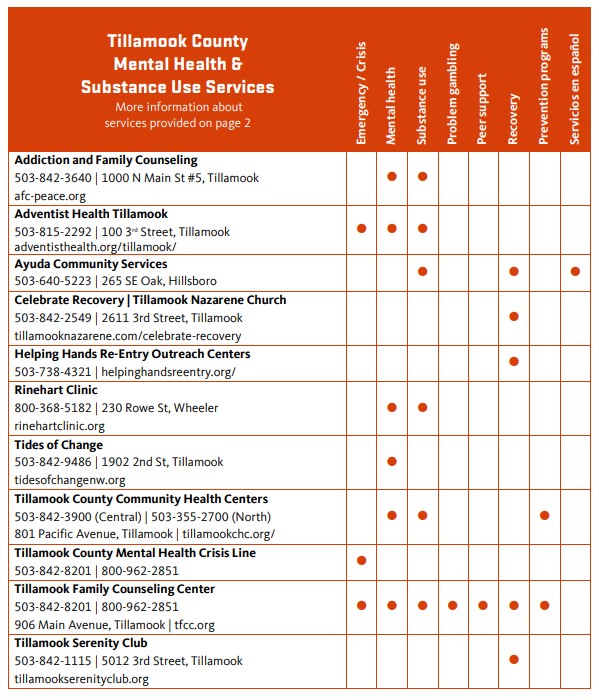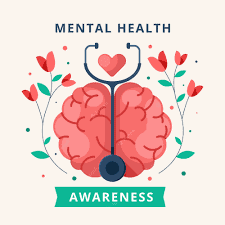By Jan Boal, RN
May is Mental Health Month. So, what exactly is mental health and what do we do about it? By definition: “Mental health includes our emotional, psychological, and social well-being. It affects how we think, feel and act. It determines how we handle stress, relate to others, and make healthy choices.”
What affects our mental being thus in return affects our physical health. Depression can increase the risk for many types of physical health problems as in heart disease, diabetes, and stroke. This is, in turn, vice versa- poor physical health leads to an increased risk of mental health challenges.
There are seven types of mental health disorders which include; mood disorders (depression, bipolar disorder), anxiety disorders (social anxiety, agoraphobia), personality disorders (narcissism, borderline), psychotic disorders (schizophrenia, delusional disorder), eating disorders, dementia, and autism.
Warning signs of mental health issues:
Change in personality – apathetic.
Changes in emotions – irritability, tearfulness.
Isolation – staying home, avoiding social engagement.
Sudden absence of self-care- dirty clothes, unkempt hair, not bathing.
Warning signs of suicide:
Sense of hopelessness or feeling overwhelmed – “What does it matter anyway?” “I give up.”
Giving away prized objects – music, stereo.
Preparedness of who would take care of pets, and family members.
 Don’t be afraid to ask your loved one if they are having thoughts of wanting to harm themselves, not wanting to wake up, etc. This will not cause them to act upon it. Usually, it is a huge relief, and they will typically share their feelings.
Don’t be afraid to ask your loved one if they are having thoughts of wanting to harm themselves, not wanting to wake up, etc. This will not cause them to act upon it. Usually, it is a huge relief, and they will typically share their feelings.
Childhood abuse, trauma and/or neglect are causes of many mental health issues. Genetics, which “runs in the family” has a play in this as well. Social isolation or loneliness, experiencing discrimination and stigma, including racism, social disadvantage, poverty or chronic debt are other conditions that interfere with one’s mental well-being. When our mental health is poor, we find it difficult to manage how we think, feel, and act in response to daily stresses.
What can we do for our mental health? Yes, I’m going to say it! Self-care!
Regular exercise boosts mood improves health and sleep, as well as relieves stress. Eat healthy, have regular meals, and stay hydrated. Food heavy in fat makes us feel slow and lethargic. High carb count results in quick energy but then a crash in energy afterward. Make sleep a priority. Engage in relaxing activities like gardening, knitting, small walks, meditation, yoga, and sitting in nature to help calm and promote good sleep. Don’t try to do everything. You can say no.
More is not better. Practicing gratitude has huge benefits. It changes the negative thought train. Make a daily list of what you are grateful for and see how your day changes for the better. Focus on positivity because we attract what we focus on. Stay connected with friends and family. Laughter is a very powerful medicine. Put the phone down, step away from social media and instead meet friends face to face for social interaction. This relieves feelings of isolation and reduces stress which turns on happy brain chemistry. Don’t be afraid to talk to someone if needed. It does help!
Here are six factors that promote good mental health: autonomy (a person’s ability to act on his or her own values and interests), environmental
mastery, personal growth, positive relations with others, purpose in life, and selfacceptance. What is your passion or what are you passionate about? Do it! Be kind to yourself. It doesn’t all have to happen today. Give yourself plenty of self-care so you feel renewed. It is all about balance in our lives. Take care and be well!
Positive Vibes Holistic Care
janboalrn@gmail.com
janboal.com



.png)